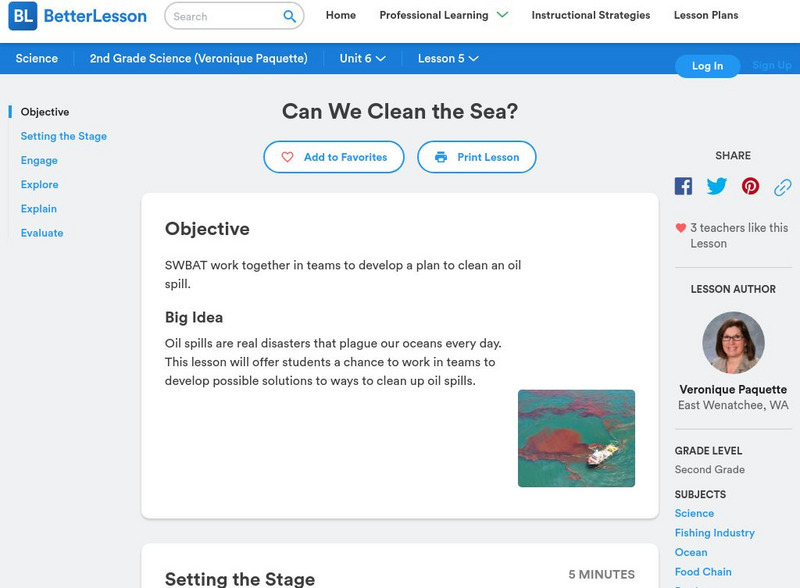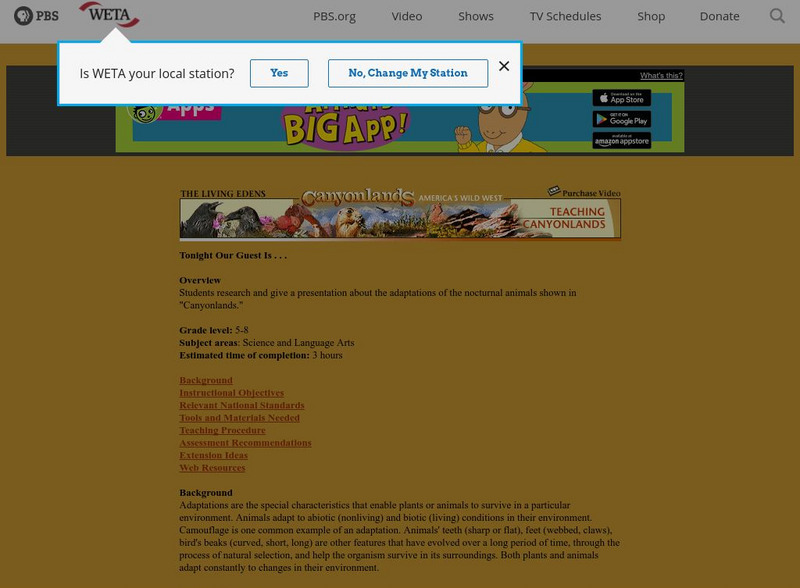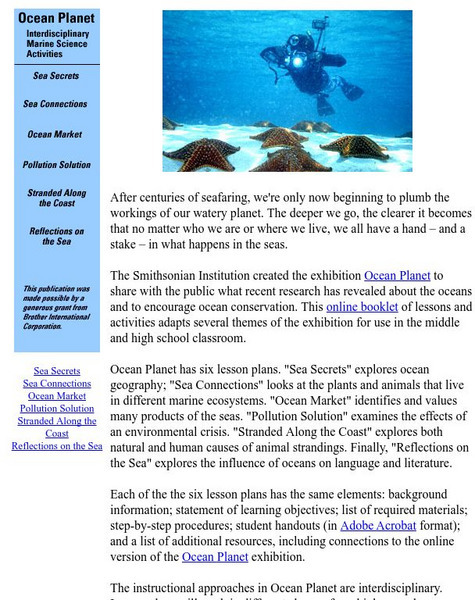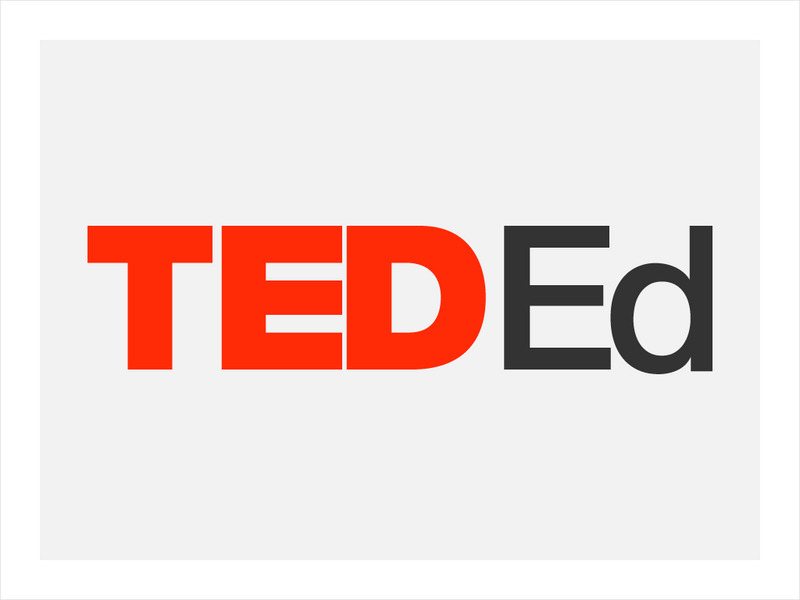Common Sense Media
Common Sense Media: Education: Lesson: Who Is in Your Online Community?
[Free Registration/Login Required] By learning the Rings of Responsibility, 2nd graders explore how the Internet connects us to people in our community and throughout the world. Help students to think critically about the different ways...
Science Education Resource Center at Carleton College
Serc: Birds: How Do We Increase the Bird Population at Our School?
This is a lesson plan of how to improve our environment as well as how to enjoy it. The students will sit in the schoolyard, study pictures of birds and then compile similarities and differences. Students will observe live birds in the...
TeachEngineering
Teach Engineering: Environment
Through 10 lessons and more than 20 hands-on activities, students are introduced to the concept of an environment and the many interactions within it. As they learn about natural and human-made environments, as well as renewable and...
Smithsonian Institution
National Museum of Natural History: Does Our Background Shape Our Thinking About Environmental Issues? [Pdf]
A lesson plan where students explore the positive and negative impacts of human activities on the environment today and in the distant past, and examine how attitudes towards the environment might be shaped by one's experiences growing...
Arizona State University
Geo Literacy: The Desert Is Theirs: Adapting to Our Environment
The focus of this 3-part lesson is how the environment affects the human lifestyle. After reading the book, The Desert is Theirs by Byrd Baylor, students will understand how animals and humans have adapted to their environments in both...
TED Talks
Ted: Ted Ed: The Case of the Vanishing Honeybees
A lesson investigating the decreasing population of the US honeybee population. There is a video that explores possible causes and the effect this decrease has on our environment. After the video, the students can test their knowledge...
Science and Mathematics Initiative for Learning Enhancement (SMILE)
Smile: Acid Rain and How It Affects Our Environment
In this lesson plan the teacher uses sulfuric acid with stones, leaves, and raw fish to demonstrate the effects of acid rain on the environment. Students create an environmental mural.
Better Lesson
Better Lesson: Measuring Our Classroom's Perimeter and Area!
Connect new measurement knowledge and skills to the students' immediate environment.
Better Lesson
Better Lesson: Can We Clean the Sea?
Oil spills are real disasters that plague our oceans every day. This lesson will offer learners a chance to work in teams to develop possible solutions to ways to clean up oil spills.
Better Lesson
Better Lesson: Welcome to 6th Grade Math
Why is math important? How does math impact our lives outside of math class? This lesson is an introduction to 6th-grade math. Students make connections between math and life while also learning procedures and rules in this 6th-grade...
Better Lesson
Better Lesson: R E S P E C T
What does it mean to respect someone? How will you show respect to our math community? Students work together to generate expectations for each other and the teacher to ensure that people are respected.
Alabama Learning Exchange
Alex: Protect Our Planet Piece by Piece
In this lesson from "The Friends of Auntie Litter", (www.auntielitter.org), food webs and their significance will be explored. This lesson is one from the "Take Pride Statewide" series. *Lesson provided by Julie Danley and Pam Walston.
TeachEngineering
Teach Engineering: Environments and Ecosystems
Students explore the biosphere and its associated environments and ecosystems in the context of creating a model ecosystem, learning along the way about the animals and resources. Students investigate different types of ecosystems, learn...
Other
K 3 Learning pages.com: Earth Day Links
How can you celebrate Earth Day in your classroom? This collection features several downloadable Earth Day worksheets including word searches and coloring pages. Students and teachers can plan the perfect way to recognize the environment.
PBS
Pbs Teachers: Canyonlands: Tonight Our Guest Is
This instructional activity will help students understand that animals adapt to abiotic and biotic conditions in their environment, some of which have evolved over a long period of time through the process of natural selection, and...
TeachEngineering
Teach Engineering: Global Climate Change
Students learn how the greenhouse effect is related to global warming and how global warming impacts our planet, including global climate change. Extreme weather events, rising sea levels, and how we react to these changes are the main...
Alabama Learning Exchange
Alex: A Look at Our Natural Environment
During this lesson students will have the opportunity to research, analyze, and collect data on how the natural environment influenced the Native Americans long ago, and how it still influences us today. Using information gathered from...
TeachEngineering
Teach Engineering: Biodomes
Students explore the biosphere's environments and ecosystems, learning along the way about the plants, animals, resources and natural cycles of our planet. Over the course of lessons 2-6, students use their growing understanding of...
Smithsonian Institution
Smithsonian: Ocean Planet: Interdisciplinary Marine Science Activities
Smithsonian Institution presents ?Ocean Planet: Interdisciplinary Marine Science Activities?. Through this series of six interdisciplinary lessons, students will look at such things as the organisms in different marine ecosystems, the...
PBS
Pbs Learning Media: Let's Learn
This collection of resources for children ages 3-8 are drawn from the public television series Let's Learn, a partnership between the WNET Group and the New York City Department of Education. Let's Learn aims to provide our young...
PBS
Pbs Learning Media: Back to School Collection
Get ready for the start of school with some of our favorite back-to-school resources! This collection features activities and video resources to help students get to know each other and their new school routines, and lesson plans to help...
Other
Learning for Justice: Part of a Community Online
This lesson focuses on helping young children learn to participate in different kinds of digital communities. Students will solidify and work on what they know about being part of any community.
TED Talks
Ted: Ted Ed: The Game Layer on Top of the World
By now, we're used to letting Facebook and Twitter capture our social lives on the web- building a "social layer" on top of the real world. In his talk, Seth Priebatsch looks at the next layer in progress: the "game layer," a pervasive...
Georgia State University
Georgia State University: Eco Connections: Conservation of Resources
During our exploration of each previous lesson, we have learned about many of the factors that contribute to the ongoing destruction of our environment. In our final lesson, we will make a holistic appraisal of the impact that each of...

















